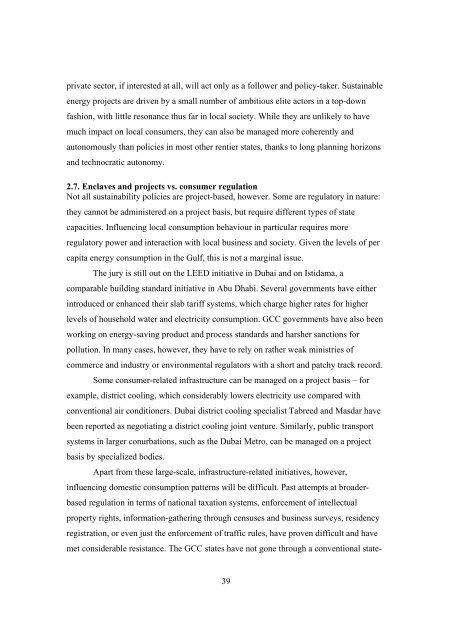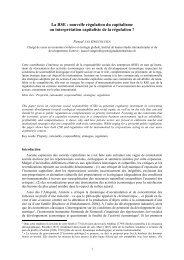PDF - Graduate Institute of International and Development Studies
PDF - Graduate Institute of International and Development Studies
PDF - Graduate Institute of International and Development Studies
You also want an ePaper? Increase the reach of your titles
YUMPU automatically turns print PDFs into web optimized ePapers that Google loves.
private sector, if interested at all, will act only as a follower <strong>and</strong> policy-taker. Sustainable<br />
energy projects are driven by a small number <strong>of</strong> ambitious elite actors in a top-down<br />
fashion, with little resonance thus far in local society. While they are unlikely to have<br />
much impact on local consumers, they can also be managed more coherently <strong>and</strong><br />
autonomously than policies in most other rentier states, thanks to long planning horizons<br />
<strong>and</strong> technocratic autonomy.<br />
2.7. Enclaves <strong>and</strong> projects vs. consumer regulation<br />
Not all sustainability policies are project-based, however. Some are regulatory in nature:<br />
they cannot be administered on a project basis, but require different types <strong>of</strong> state<br />
capacities. Influencing local consumption behaviour in particular requires more<br />
regulatory power <strong>and</strong> interaction with local business <strong>and</strong> society. Given the levels <strong>of</strong> per<br />
capita energy consumption in the Gulf, this is not a marginal issue.<br />
The jury is still out on the LEED initiative in Dubai <strong>and</strong> on Istidama, a<br />
comparable building st<strong>and</strong>ard initiative in Abu Dhabi. Several governments have either<br />
introduced or enhanced their slab tariff systems, which charge higher rates for higher<br />
levels <strong>of</strong> household water <strong>and</strong> electricity consumption. GCC governments have also been<br />
working on energy-saving product <strong>and</strong> process st<strong>and</strong>ards <strong>and</strong> harsher sanctions for<br />
pollution. In many cases, however, they have to rely on rather weak ministries <strong>of</strong><br />
commerce <strong>and</strong> industry or environmental regulators with a short <strong>and</strong> patchy track record.<br />
Some consumer-related infrastructure can be managed on a project basis – for<br />
example, district cooling, which considerably lowers electricity use compared with<br />
conventional air conditioners. Dubai district cooling specialist Tabreed <strong>and</strong> Masdar have<br />
been reported as negotiating a district cooling joint venture. Similarly, public transport<br />
systems in larger conurbations, such as the Dubai Metro, can be managed on a project<br />
basis by specialized bodies.<br />
Apart from these large-scale, infrastructure-related initiatives, however,<br />
influencing domestic consumption patterns will be difficult. Past attempts at broaderbased<br />
regulation in terms <strong>of</strong> national taxation systems, enforcement <strong>of</strong> intellectual<br />
property rights, information-gathering through censuses <strong>and</strong> business surveys, residency<br />
registration, or even just the enforcement <strong>of</strong> traffic rules, have proven difficult <strong>and</strong> have<br />
met considerable resistance. The GCC states have not gone through a conventional state-<br />
39




